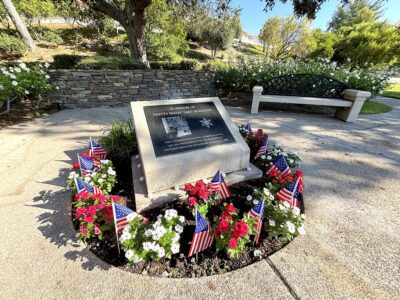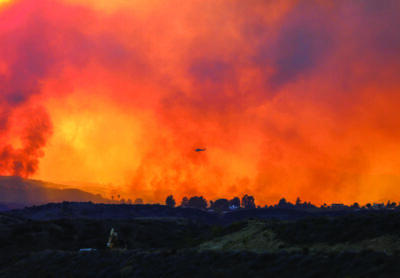Her mom was crying over the phone because her daughter, who doesn’t typically get such opportunities, worked as the script supervisor and a production manager on the upcoming student-crewed, Screen Actors Guild-qualified original television series “The Valley.”
According to Bavand Karim, co-director of the film program at College of the Canyons and writer-director of the show, this mom on the phone, like others involved in the project, seemed so grateful for the experience to crew a production of that caliber.
“That’s really, I think, the meaning that’s created,” Karim said during a recent telephone interview. “It’s the inspiration that takes place. It’s like, yeah, a product is on the market, the students get the work experience, but really, they find meaning, they find the value of their own selves and their own work through projects like this. They feel included in something. I understand the value of that so deeply because, as an Iranian American, I’ve never fit in. I’ve never been accepted fully as being an Iranian or fully as an American. So, to relieve that pressure for some of these students is the most meaningful thing for me.”

“The Valley,” according to Karim, stars Keyon Tuiteleleapaga as a homeless college student named Early “Free” Freeman who’s 11 credits short of completing his degree when he discovers that his tuition check has bounced. The eight episodes of the show follow Free’s surreal journey as he struggles to maintain friendships and complete his coursework while searching for jobs and a place to live.
Karim, who’s also the founder and chairperson of the production companies CINE and Lost Winds Entertainment, has produced several independent films and worked on many projects in which he utilizes the talents of both professionals and students alike. Along with his co-producer, Robert Reber, a professional cinematographer, the two managed a team of 14 filmmaking students over the course of four months to shoot “The Valley.”
Last year, Karim began writing the series. He said it was inspired by the COC campus — not only the look of the place with its green spaces, trails and hillsides, its culinary institute, theatrical space, storefronts, cafes and courtyards, but also the students themselves.
“One night, I realized that some of these students lingering around campus late at night and early in the morning — the ones who are always tucked against the wall, trying not to draw your attention — are living on campus,” he said. “They’re homeless and looking for a safe place to stay while they focus on their education. That’s where the idea came from. It was inspired by our own students who are struggling to make ends meet.”
According to Karim, the series is an original concept. However, the idea to create a project that utilizes the talents of students and professionals is not new.

That type of hybrid student/professional collaboration has become one of his specialties.
“Over the years,” he said, “my career has been split between higher ed and the entertainment industry. One of my first teaching positions was to run a college TV station, and we produced a bunch of original programs, won some awards and received some recognition.”
Karim has done similar projects at a number of schools around the country. He came to COC in August 2023. It didn’t take long before he got around to that kind of undertaking there. He hopes it won’t be the last.
He and his cast and crew began production in February. Principle photography was eight days, not including a few days of pick-up shoots. The budget for the series, according to Karim, was $10,000, which he paid for out of his own pocket. The school, he added, helped out with food costs.
Karim spoke about how the production worked. On the first day, he said, a professional cinematographer, his filmmaking partner Reber, who’s also an adjunct faculty member who teaches cinematography, among other courses, shot the majority of the scenes himself.
“By the last day,” Karim said, “the students were doing everything.”

“The Valley” is currently in post-production. And while Karim hasn’t seen any of the scenes assembled, he said he was very pleased with what they captured on camera.
Most of all, he’s most thrilled with the value that COC and the program are offering students. A product of a film school education himself, Karim worked on many student films, albeit projects that were very student-centered. Giving students the opportunity to work on a truly professional production with industry talent, he said, provides valuable experience that so many film schools simply don’t offer.
“COC’s mission is to serve underrepresented students,” Karim said. “These students have significant barriers to (gain) entry in the industry. They don’t have resources or opportunities compared to the places that I taught before or where I went to school. So, I understand the value of these experiences.”
He spoke about students on the crew who are the children of immigrants, who have special needs or who face other barriers to be able to participate in production work.
“What we want the community, the surrounding high schools and colleges to see is that we don’t necessarily have to wait for studios or major production companies to come and create these opportunities for us in a commercial sense,” he said. “We can create these programs ourselves.”

Karim shared more about the phone call he had with that mother who seemed so grateful for the experience that her daughter, Daniella Karney, got on the project. Karney is a COC student who, she said, needed “supports that were beyond regular accommodations” on the shoot.
Karim did whatever he could to give her the chance to work on the series.
“She never gets these types of opportunities, and we brought her on as a production manager,” Karim said. “I said, ‘The reason we created this is to give opportunities for people like you.’ She’s very organized and diligent and detail-oriented. I just thought she’d bring a lot to the show. She’s done a fantastic job.”
During that phone call with her mom about Karney’s accommodations, Karim said she broke down in tears because her daughter had never gotten an opportunity like that before. She was so thankful. And Karney was thankful.
“He did everything he could to make everyone on set feel welcome,” Karney said in a recent telephone interview. “I feel really good about the progress that I’ve been able to help with on the show, and because of Bavand, I’m able to be a part of this, and it feels really incredible.”
Karney’s mom said she got emotional over the phone with Karim because he went out of his way to prove he’d support her daughter in any way possible so she could work on the project. Her mom added that, on set, she saw how Karim was like that with everyone.
That mentality, she said, was a carryover from the story of “The Valley.”
“It’s about the community taking care of each other in this difficult world,” she said. “That message is Bavand. That’s what he did for my daughter and for others.”
Karim hopes for the series to air on SCVTV in August or September. Until then, he’s just excited to start editing.








